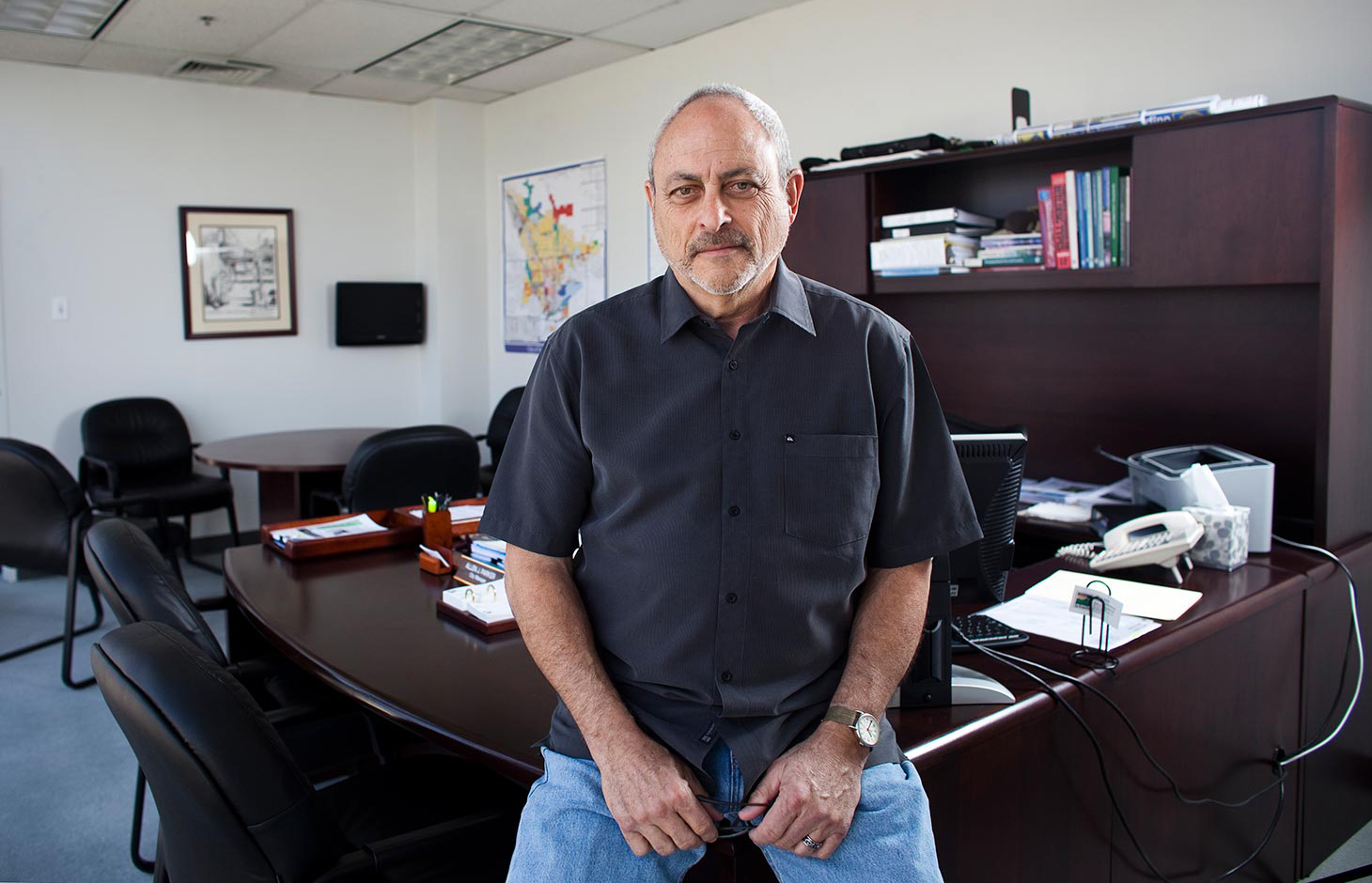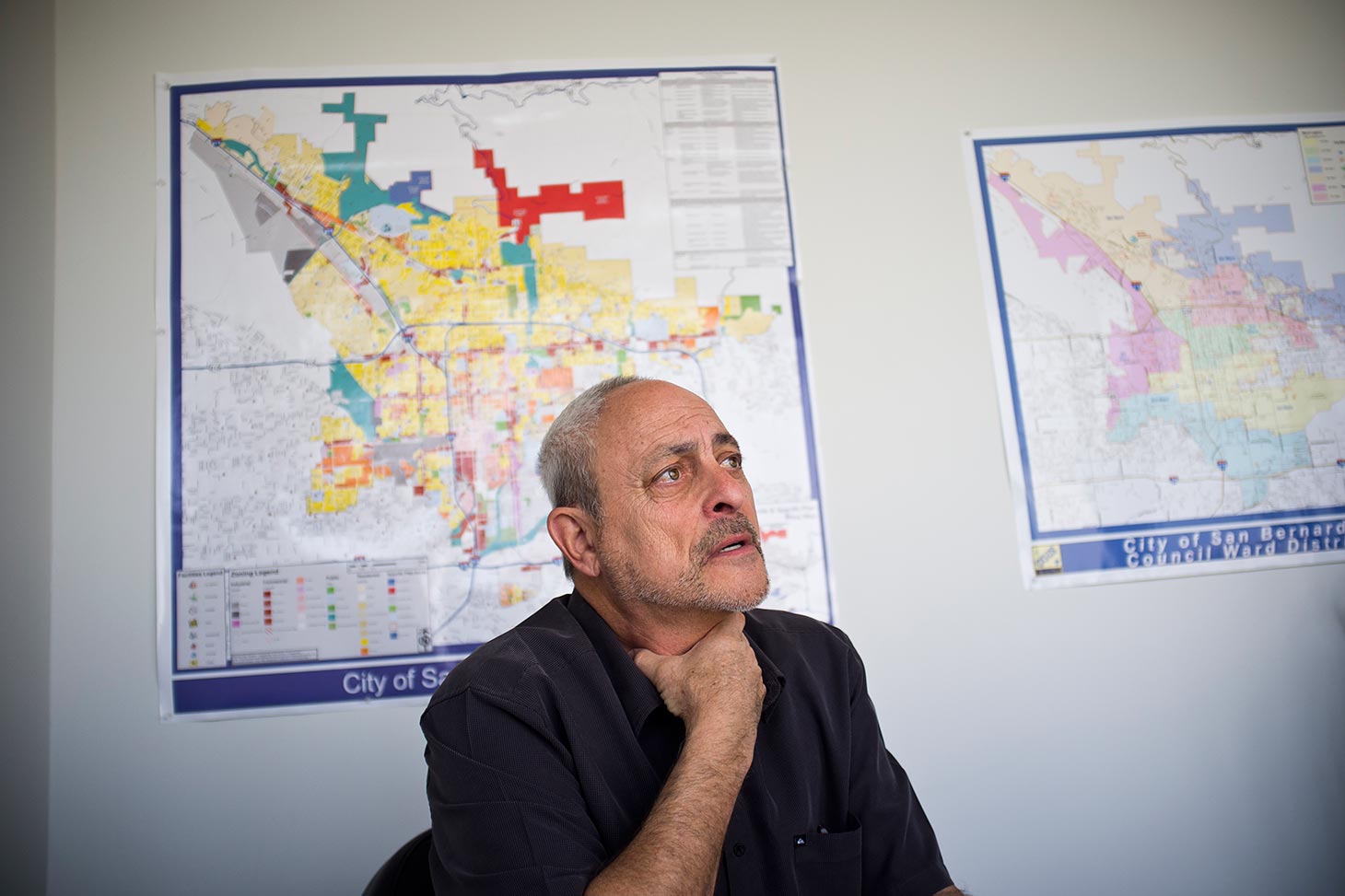
The Sovereign Matchmaker
MeetAllenParker,themiddlemanpaydaylendersneedtofindNativeAmericantribes
By Joanna Zuckerman Bernstein, Julia Harte for Al Jazeera America
Photos by Robert Gallagher for Al Jazeera America
Produced by Alex Newman, Joanna S. Kao, Lam Thuy Vo
Edited by Katherine Lanpher, Mark Rykoff
The stories and graphics for Payday Nation were reported and produced in collaboration with the Stabile Center for Investigative Journalism at Columbia University in New York.
Published on Thursday, June 19, 2014
SAN BERNARDINO, Calif. — Allen J. Parker has declared personal bankruptcy twice, been fired from his day job four times and owned a string of failed businesses. His latest incarnation is as the city manager of this Inland Empire city in southern California. He was hired to lead the city out of bankruptcy last year, sparking headlines around the country about his own financial woes.
But in the world of tribal online payday lending, his financial advice is valued. Parker, 72, is what’s called a “matchmaker,” a middleman who brings together two worlds that would not otherwise meet: Native American tribes and payday lending enterprises.
For the tribes, usually located in desolate or remote places, the payday operations offer the hope of a much-needed revenue stream. For the online payday loan businesses, chased by regulators who accuse them of predatory lending to the poor, the tribes offer hope of a shield.
Parker isn’t the kingpin of the industry. But he’s a good example of the dealmakers who seek to capitalize on sovereignty, which grants federally recognized tribes immunity from state lawsuits. By partnering with tribes, online payday lenders can operate in states where payday loans are restricted. Twenty-four states have such limitations, according to the Pew Charitable Trusts.
Along with the incentive of revenue, tribes don’t have to do any of the work, as the lenders typically manage the business operations themselves. The lenders find investors, run the call centers, procure the loan software and hire lead generators, who advertise the loans to consumers.
Consumers get the loans by searching online. After borrowers type in their bank account information, a two-week loan of a few hundred dollars is automatically deposited into their accounts — enough to help them get by until their next payday. Lenders argue that they offer a crucial service for people with poor credit histories, who might not qualify for bank loans. But with annual interest rates that can exceed 400 percent, borrowers often can’t pay back the loans on time, incurring additional interest and fees. A report from the Pew Charitable Trusts found that payday loans keep borrowers in debt for an average of five months.
Payday lenders pay tribes a monthly fee of 1 to 2 percent of revenue to use their sovereign immunity.
But it’s people like Parker who negotiate on a tribe’s behalf. Parker said he makes sure his tribes get at least $3,000 to $5,000 per month.
“It’s not casino income,” he said, but for an impoverished tribe with few business prospects, it can be a “tremendous opportunity.”
Parker was the chief administrator for the Morongo Band of Mission Indians, whose reservation is about 35 miles east of San Bernardino. He served in that position for nearly six years, until he was fired in 2006. That experience, he said, makes him the ideal “matchmaker” in the industry. He knows the tribes and can reach out on their behalf to representatives of payday lending enterprises.
Jer Ayles-Ayler, a prominent payday loan consultant in Newport Beach, California, sometimes works with Parker.
He recalled one meeting, at a tribal casino in Southern California. “They had extreme trust in him,” Ayles-Ayler said. “At one point, the chief cut out of the conversation we were having and said, ‘Allen, are you in this?’ and he said, ‘Yes,’ and they said, ‘If you’re in this, then so are we.’”
Since he became involved in the tribal lending industry in 2011, Parker said, he has worked with four tribes. Sometimes he works for other matchmakers, helping to find and vet payday lenders.
Parker, like many in the industry, insists there is a consumer demand for payday lending and the only part that is occasionally “predatory” is the debt collection practices. “You have a willing borrower and a willing lender. The people going into it know that they’re paying high rates.”
For matching a tribe with a payday lender, Parker gets 10 to 15 percent of the tribe’s monthly share. Parker said he made about $20,000 last year and expects to earn about $15,000 this year. State and federal crackdowns on online payday lending slowed revenue to a trickle last winter, but Parker said that now his clients’ businesses are back up and running.
Parker has had a long and varied career. He grew up in Kansas City, Missouri, where his family owned a grocery store, but he’s been in California off and on for decades. He first moved there in the 1960s, after dropping out of college, to join a friend working in the orange groves of Orange, California. He graduated from Chapman University in 1965 with a degree in business and economics, and received his master’s in public administration at the University of Kansas in 1968.
Over the years, Parker said he was fired from his post as city manager by one city in Illinois and two in California: Oak Park, Half Moon Bay and Compton.
He hasn’t had much luck as an entrepreneur either. Before venturing into tribal lending, he started three businesses; all were dissolved or suspended within a few years. One was a headhunting firm for city governments.
“I thought it would be a niche market,” he said, “but it never got off the ground.”
Despite increasing attention on the payday lending industry from state and federal regulators, Parker remains relentlessly optimistic about the prospects for his latest venture.
While tribal payday lenders have successfully fended off legal challenges in state courts, a federal court recently ruled that tribe-affiliated businesses are not immune from federal regulation.
On March 7, a U.S. District Court judge in Nevada ruled that the tribal affiliations of payday lender Scott Tucker — he is affiliated with three Native American tribes in Oklahoma and Nebraska — don’t make his businesses exempt from the Federal Trade Commission’s federal consumer protection laws. On May 28, the same judge ruled that Tucker’s businesses violated Federal Trade Commission laws by engaging in deceptive lending practices.
On their websites, tribal lending companies typically say they are “wholly owned and operated by” the tribes. But on recent visits to six reservations where tribes claim to own payday businesses, only one appeared to be doing business on the reservation. On the reservations of two of Parker’s clients, the Big Lagoon Rancheria and the Wakpamni Lake Community Corp., there were no signs of payday lending.
If they’re the real owners, “why are we making 98 percent and they’re making 2 percent?” said a payday lender who worked with tribes for several years and asked not to be named. In the lender’s deals, the tribes were paid 2 percent of monthly profits.
The lender pulled out of the tribal lending industry last winter because of Operation Choke Point, the federal crackdown that suspended some payday lenders’ access to consumers’ bank accounts.
“They’re killing online lending,” said another “matchmaker,” Stephen Gomes, about Operation Choke Point. Gomes, who worked with Parker to bring payday lending to the Wakpamni, in South Dakota, said he’s moving on to other tribal business ventures.
Parker acknowledged that the industry is in a “state of flux.” But he is confident that — finally — he has invested in a good business model in tribal payday lending.
“The tribal model will prevail,” he said. “They can’t stop, they won’t stop the sovereign model.”




